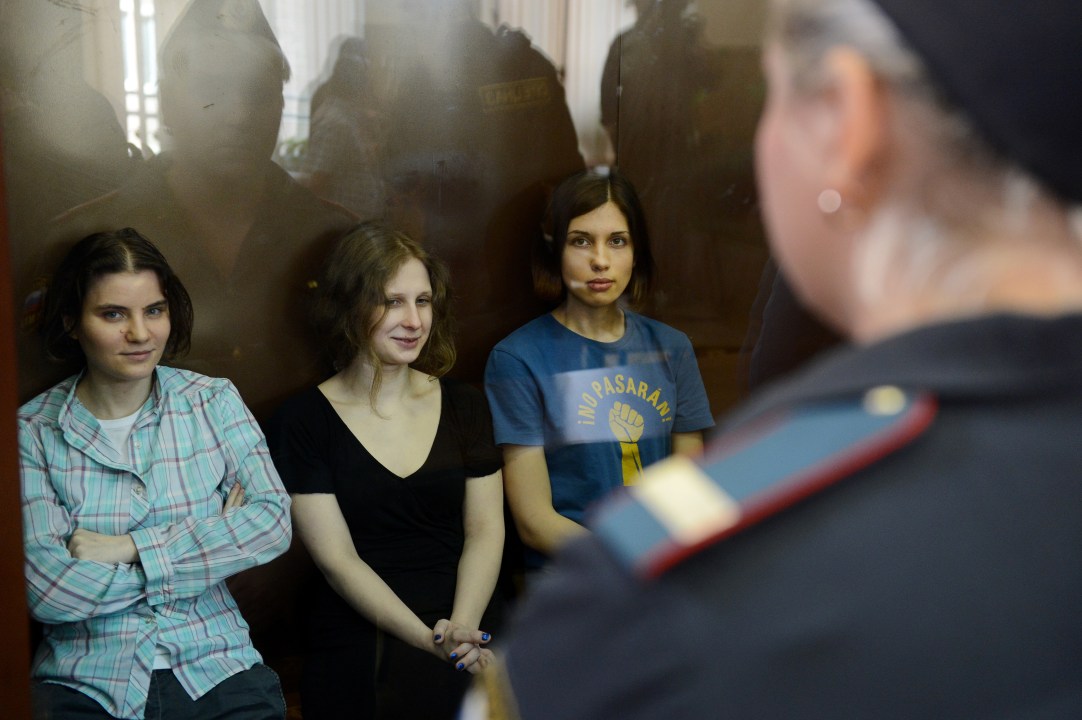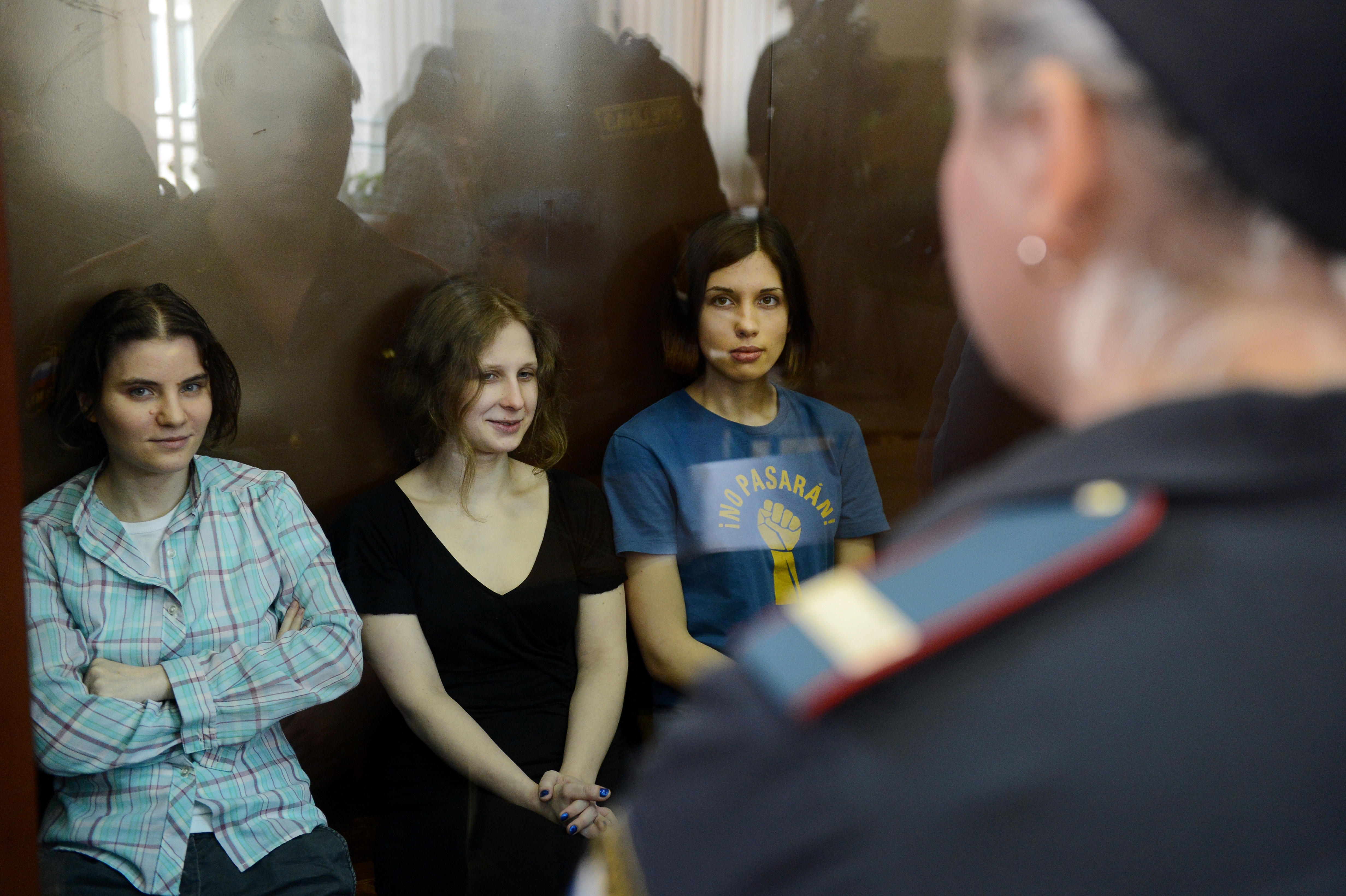One of the happiest things about writing for the Spectator is that there is no editorial line. Indeed the editor is always pleased by an intra-mural rammy. So there’s this: Dennis Sewell’s argument that Pussy Riot, the only all-girl Russian punk band you’re likely to have heard of, have been asking for trouble and deserve some of the trouble they’re receiving is the lamest sort of counter-intuitive, concern-trolling journalism. It helps pay the bills, mind you, so there’s that too.
Having typed the obligatory “Of course Putin is ghastly” paragraph (or, as Sewell puts it, the Russian president is “a nasty, unscrupulous weasel” which, perhaps unwittingly, makes Putin seem a character from The Wind in the Willows) our brave contributor argues that, however much Nadia, Masha and Katya have been wronged they – and we – should remember they’ve been in the doing wrong business too. You see:
There is, though, something that has been missing from the extensive Pussy Riot narrative: any proper moral reasoning about their protest and the way in which they chose to make it. These punks disrupted a church service, caused offence to worshippers and terrified at least one nun. They jumped up and down close to the altar screeching a mock prayer to the Virgin Mary to ‘get rid of Putin’. Words such as stupid, crass, insensitive and disrespectful come to mind. Why aren’t we using them?
Because most people aren’t quite so stupid, crass or insensitive as to reckon offending worshipers as part of a political protest – even one invoking, heavens, a “mock prayer” – is quite the sort of thing that merits a couple of years in a Russian slammer. (This is so even if one suspects their mock prayer was needlessly offensive.)
Granted, Sewell agrees that the punishment meted out to the girls is disproportionate but he seems hellbent on insisting they should be punished in some fashion. (Citing opinion polls reporting that many Russians think they should be punished is irrelevant. So what? Why does that mean we should think the girls should be punished?)
He continues:
Although many Russian Orthodox churchgoers would agree with Pussy Riot’s complaint that some of the church’s senior clergy are just as financially corrupt and politically compromised under Putin as they were under communism, they wouldn’t agree that clerical venality was a good enough excuse for disrupting prayers or mocking the Theotokos. In the West, by contrast, there has been scant acknowledgment that the punks really did anything wrong or even questionable.
Perhaps that’s because many people – albeit in the west but perhaps elsewhere too – don’t think Pussy Riot did anything especially questionable or terribly wrong. Moreover, clerical venality is an excellent justification for “disrupting prayers” and even, on occasion, daring to mock the Theotokos. This may remain the case even if many members of the Orthodox church do not think it so.
For that matter, I had not thought it necessary to observe that there’s some great dissonance here between the gravity of the “offence” and the punishment meted out. Granted, by historical Russian standards the intrepid – which is to say, perhaps foolish but certainly brave – ladies are escaping relatively lightly. But so what?
There’s a choice to be made and Pussy Riot’s cause is not made the less remarkable or important simply because they are supported by Madonna or even, doubtless and in due course and for god’s sake, Bono. If asked to choose between Pussy Riot and Vladimir Putin I’ll happily side with the punk band and those like them who oppose Russia’s present twilight police state.
Of course it’s easy to write that here. But even safe sympathy is surely better than the kind of moralising nonsense that pays lip service to Putin’s ugliness before devoting so much more time and space to criticising the actions of a mere punk band.
Sewell suggests the trio are not serious dissidents. Their lack of seriousness, naturally, means that while what has happened to them is regrettable (even unjust!) it is hardly either surprising or something anyone else should find too bothersome. Or something like that, anyway.
Again, one can appreciate that for all its tyrannies Putin’s Russia is not Stalin’s Russia. But if – with all due nodding to Mr Waugh – we class countries as Leading Country, First-rate Country, Good Country and Country we may also agree that Russia is still in the Country class and that, between you and me, “Country is pretty bad”.
Sure, by historical standards, Pussy Riot may have less to complain about than did their ancestors. They still have plenty about which to complain. As for their seriousness, I suggest you read Nadezhda Tolokonnikova’s closing statement at this “trial”. Among her points:
We were looking for authentic genuineness and simplicity and we found them in our punk performances. Passion, openness and naivety are superior to hypocrisy, cunning and a contrived decency that conceals crimes. The state’s leaders stand with saintly expressions in church, but their sins are far greater than ours. We’ve put on our political punk concerts because the Russian state system is dominated by rigidity, closedness and caste. Аnd the policies pursued serve only narrow corporate interests to the extent that even the air of Russia makes us ill.
We are absolutely not happy with—and have been forced into living politically—by the use of coercive, strong-arm measures to handle social processes, a situation in which the most important political institutions are the disciplinary structures of the state – the security agencies, the army, the police, the special forces and the accompanying means of ensuring political stability: prisons, preventive detention and mechanisms to closely control public behaviour. Nor are we happy with the enforced civic passivity of the bulk of the population or the complete domination of executive structures over the legislature and judiciary. Moreover, we are genuinely angered by the fear-based and scandalously low standard of political culture, which is constantly and knowingly maintained by the state system and its accomplices. Look at what Patriarch Kirill has to say: “The Orthodox don’t go to rallies.” We are angered by the appalling weakness of horizontal relationships within society. We don’t like the way in which the state system easily manipulates public opinion through its tight control of the overwhelming majority of media outlets.
Perhaps you think she protests too much. Perhaps you think her punk protest misguided. I’m not sure, however, that you can really doubt her seriousness. Note too the desire to live without politics and with it the implied question: how can you live without politics in a state that outlaws politics? I’d suggest that’s a serious question and a moral one of the kind you won’t find from many people in other, happier countries.
She concludes:
Finally, I’d like to quote a Pussy Riot song because, strange as it may seem, all our songs have turned out to be prophetic, including the one that says: “The KGB chief, their number one saint, will escort protestors off to jail” – that’s us. What I’d like to quote now, however, is the next line: “Open the doors, off with the shoulder-straps, join us in a taste of freedom.”
That’s not too bad either. And as a result of their actions many more people around the world have some clearer understanding of at least some aspects of life in modern Russia. For a bunch of punk rockers lacking suitable or credentialled seriousness that’s no small achievement. Some publicity or protest stunts, you see, have some value. This remains the case even if you suspect, with some reason, that Pussy Riot have for some time been daring the state to take action against them.
So, yes, Pussy Riot were right and the state’s reaction to their crimes demonstrates that quite sufficiently. Perhaps we can’t do much for them or other Russians chafed by life under Putin but the least we can do is refrain from suggesting that, in whatever fashion, they had it coming.
UPDATE: I agree with His Grace, Archbishop Cranmer and commend his post to you.








Comments